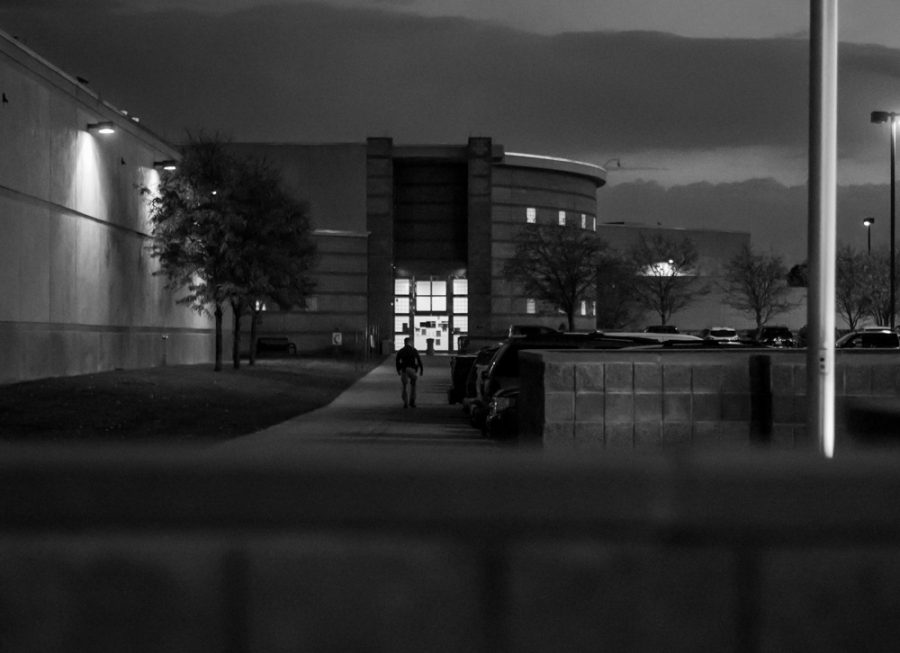Lezaic: H.B. 479 Exhibits Utter Disregard For Incarcerated People
A police officer enters the Salt Lake Metro Jail in South Salt Lake City on Election Day, Nov. 3, 2020. (Photo by Jack Gambassi | The Daily Utah Chronicle)
March 6, 2023
Following three reports of correctional officers being assaulted in Utah’s state prisons, the State Legislature introduced H.B. 479. Rep. Jefferson Burton’s bill seeks to create a task force that investigates the reasons for these assaults, but this bill is unnecessary and attempts to further incriminate incarcerated people facing abuse at the hands of our state.
The Push for a Working Group
Lawmakers are only just creating a working group to investigate the troubling situation at the new Utah prison, despite previous reports of issues that centered the well-being of incarcerated people. One of the main goals of the working group is to figure out how to retain correctional officers. That should be the least of our worries.
State officials want this task force out of concern for correctional officers. But where has this concern been whenever incarcerated people or their loved ones have brought up the never-ending abuses in Utah’s carceral system? The level of abuse this state enacts on incarcerated people goes far beyond the retaliation against correctional officers. Instead, we should be realizing that these assaults likely arise from abuse either by the officers themselves or by the very nature of the prison.
Prioritize Incarcerated People Over Officers
We should be focusing on protecting the disenfranchised people in prisons whose safety is at the whim of notoriously overprotected and abusive correctional officers. Over the last few years, we’ve seen incarcerated people in Utah get tortured, extorted, exploited, degraded and abused — physically, mentally and medically. Yet the people getting prioritized here are the power-trippers who say things like, “You can’t do shit, I’m a cop … This badge says I can do anything I want to anyone here.” Despite that, there doesn’t seem to be as much of a push from the legislature to investigate the conditions of incarcerated people.
Meanwhile, the state is concerned with retention rates so they can better police people. And because our government has legitimized and empowered the secret societies posing as police unions, officials now find themselves eating out of the palms of these unions’ hands. The Utah chapter’s executive director of the Fraternal Order of Police — the nation’s largest police union, which has worked with white supremacist groups — blamed the governor for issues such as understaffing and low retention rates. Despite Utah leaders substantially increasing officer wages by up to a whopping $15 extra an hour, FOP Utah executive director Chad Bennion hopes that the state will set aside an additional $42 million for prison staffing. It’s safe to say that when a police union gets involved, the police aren’t the biggest victims in the situation.
The Bill’s Red Flags
There’s very little in H.B. 479 about what the task force would entail. It only establishes who gets to appoint who, as well as a suspiciously vague section about salaries. And the cherry on top is that only one person in the entire fifteen-person task force would represent the inmates — even then, a legislator would appoint them rather than their fellow incarcerated people.
There have already been multiple audits in recent years that expose the abusive actions of Utah’s prisons and outline recommendations for change. These audits also report that the prisons aren’t making appropriate efforts to follow these suggestions. It’s obvious that even if another investigation was needed, officials wouldn’t listen to its findings.
Additionally, we are undoubtedly going to see the officers’ stories prioritized over those of the incarcerated people involved. We don’t need to hear the griping of glorified cops — the same people responsible for locking disabled incarcerated Utahns in tear gas chambers and siccing dogs on them. We cannot trust an audit to tell us the story from the most overlooked and silenced perspectives when we’ve been given little reason to trust the internal processes of the prisons. In fact, we have reason to distrust the task force, given that our legislators have shown their priorities lie in maintaining the status quo and their own personal profits. The only thing this bill would do is drain more money from the state and funnel it into the carceral system.
We know what the issue is. It’s inhumane treatment of human beings through incarceration. The state spent over a billion dollars to relocate the prison to swampland rather than rehabilitate people and provide them with the resources they need. While true change will never come from the government, our legislators need to grow some spines and stop beating around the bush. How much more money and time will go toward hurting incarcerated people, rather than empowering them to live the lives they deserve?
For more information on prison abolition in Utah, follow groups like the Salt Lake Community Bail Fund.








